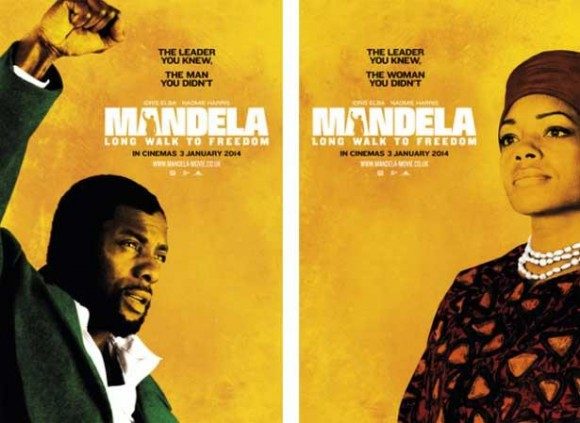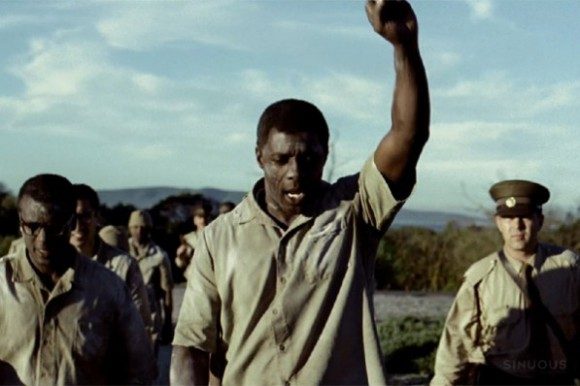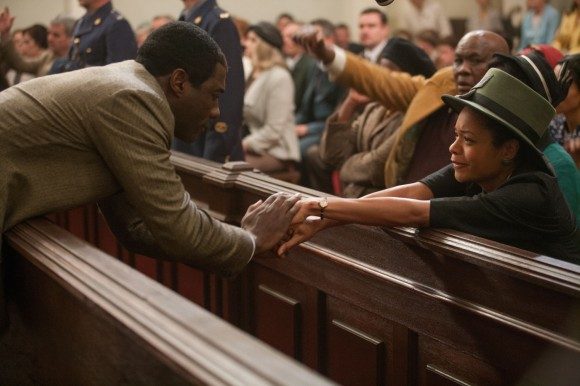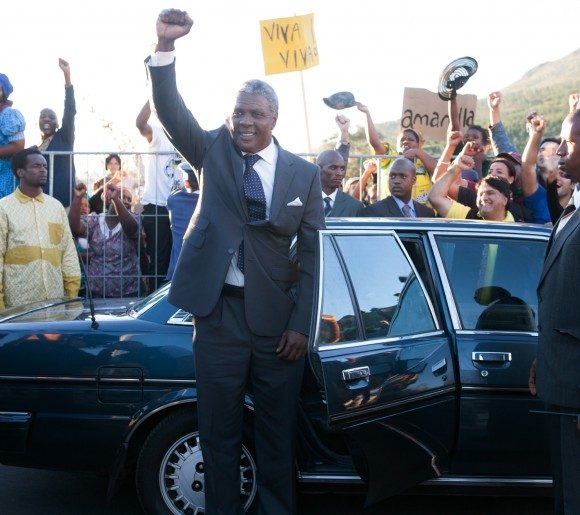There’s plenty worth discussing about Mandela: Long Walk to Freedom, but probably more than any other film this year, it’s impossible to divorce the movie from the time in which it was released. Justin Chadwick’s (The Other Boleyn Girl) biographical epic debuted earlier this year at the Toronto Film Festival before seeing a limited theatrical release beginning November 23rd, before the former South African President Nelson Mandela’s death on December 5th. Now in wide release, it’s almost impossible to look at the film as anything but a eulogy on his life and work. This may strike some as odd, given that the movie is based on Mandela’s own autobiography, but as interpreted by Chadwick, writer William Nicholson (Gladiator), and lead actor Idris Elba, it feels like an honest and fitting tribute to a complicated man who lived through an incredibly tumultuous time in South Africa.
It is with Elba that any discussion of the movie’s merits must begin. With apologies to Naomie Harris who does some inspired work as Winnie Mandela, Elba positively carries this picture with a performance that has to be considered among the year’s best. From an energetic young lawyer in the 1940s and ‘50s to an elder statesman in the mid ‘90s, Elba never once looks out of place. He’s helped in part by some truly excellent makeup that ages him well and avoids some of the plasticky look that you often see when a younger actor is made up to be decades older, but it’s Elba who sells the ruse. He does a phenomenal job of adjusting his mannerisms, particularly the way he walks and moves his head, to very realistically reflect his changing age over the course of the picture. This is to say nothing, of course, of his dramatic presence on screen which is similarly stellar.
The narrative faults of the movie are few and far between, an achievement for a film that ambitiously spans Mandela’s entire adult life (indeed, the movie opens with a tribal ritual conferring manhood onto young Nelson and other boys from his tribe). The movie employs a few familiar strategies to overcome great leaps in time, like voiceover on a quick succession of scenes to communicate passing weeks in one effort or another, and while I never found these to be distracting its conceivable some in the audience would. Similarly, Mandela’s courtship of both his first wife and Winnie seems to happen in about a day, but this doesn’t really detract from anything. Their love story isn’t the focus. We want to know that they met and they got married, that’s all that matters and we can move on. It almost works to the film’s advantage, in one respect; as Mandela is laying out the timeline for a guard near the end of his imprisonment, we realize just how little time the two had together before Mandela was sent away. The one plot issue I did have was that the movie doesn’t do a great job of marking the Mandela’s transition from simply one of the leaders of the ANC (his political party) to the singular rallying national figurehead. Before his imprisonment, it seems he’s no more important than several other ANC leaders, but later it’s “Free Nelson Mandela” that becomes the familiar rallying cry, not “Free the ANC.”
The quibbles I do have lie more with the pacing than the storytelling itself. For the majority of the movie, it moves along at a very appropriate clip. We’re not taking time to understand all the parts of any single event, but it never feels like the movie rushes either as we move through time from key event to key event. This changes a bit towards the end of Mandela’s prison sentence into the early part of his late political career, basically the last 40 minutes of the movie, where it does feel as though the story takes far too long to advance its plot. Particularly given the 139 minute runtime, a five minute trim in this area could have gone a long way, and there was plenty of space to do it without impacting our understanding of South Africa’s political climate or Mandela’s personal leanings.
What Mandela: Long Walk to Freedom does really well, though, is present an image of the whole man. Nelson Mandela exists in the zeitgeist as a universally positive figure, a South African Ghandi. And while no one should dispute the man’s greatness nor the remarkable piece of work he did in peacefully unifying the South African government, it’s impossible to ignore that the man was no saint. The film carries an appropriate level of respect for one of the great men of our time, but it isn’t afraid to show his womanizing early years, or his championing, for a time, of violent opposition. The movie does seek to justify his use of violent methods (and does so without being patronizing), but also includes, ultimately, a uniform condemnation of violence wherever it might be found.
The Verdict: 4 out of 5
Mandela: Long Walk to Freedom is an incredibly timely look at what is literally the life’s work of one of the great men of the 20th century. Powerhouse performances form Idris Elba and Naomie Harris anchor this effort, backed by an excellent balance of 50 dense years of history on the part of writer William Nicholson and director Justin Chadwick. There are some pacing issues and other minor annoyances that hold it back a bit, but all in all this is an excellent biopic.




